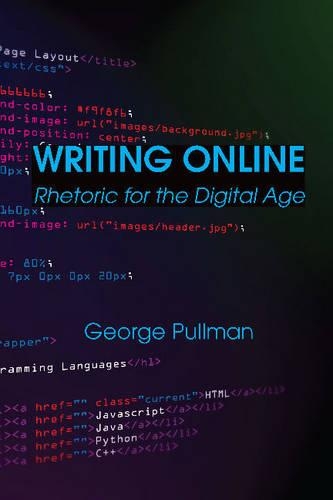
Writing Online: Rhetoric for the Digital Age
(Paperback)
Publishing Details
Writing Online: Rhetoric for the Digital Age
By (Author) George Pullman
Hackett Publishing Co, Inc
Hackett Publishing Co, Inc
1st May 2016
United States
Classifications
General
Non Fiction
808.0420285
Physical Properties
Paperback
224
Width 140mm, Height 216mm
Description
Contrary to the old adage about finding new names for old things,Writing Online: Rhetoric for the Digital Agegives new life and new meaning to old names. The book and its companion website transform ancient rhetoric as a process of oral compositioninvention, arrangement, memory, style, and deliveryinto a digital rhetoric, a dynamic process of writing for the World Wide Web: dynamic because it shows not only how to write in a Web-based medium but, more importantly, how to learn and adapt to a medium that is constantly evolving and changing.
Reviews
" Writing Online is a vital resource for teachers, scholars, and students interested in developing and researching the role of technology in fostering a digital writer's identity and ethos. Early on, Pullman makes an important distinction between reading and using this groundbreaking text, with an emphasis on the pragmatics of information and document design in digital space that is sorely missing in many interdisciplinary texts on web authoring. As an accessible introduction to the tools, language, and processes of digital composing, including significant overviews of code literacy, Writing Online is more than a 'how-to' book. Indeed, its grounding in digital rhetorical practices ensures that users move from passive consumers of online content to active, successful producers of it. Ultimately, Writing Online reinforces that digital composing is as much a part of the rhetorical tradition today as both speech and writing have been throughout the ages." Kristine L. Blair, Bowling Green State University
"In Writing Online , George Pullman reboots the time-tested strategies of rhetoric for an age of digital production. The result is a flexible and durable approach to composing that will suit writers preparing for a world where 'text' is a verb and digital strategy means rapidly repurposing a video clip from a 1980s TV show. Pullman's book shows that in this world of memes and tweets, we needn't lose the sophistication of a well-crafted balance of ethos, logos, and pathos, nor should we abandon the higher purpose of a rhetorical education: preparing ethical digital citizens. But Writing Online is not an homage to the past. Rather, at its heart, it is a thorough and valuable refiguring of the boundaries of rhetorical inquirythe five canons of rhetoricinvention, arrangement, style, memory, and delivery. Each is updated to bring a strategic focus to the use of digital resources such as the use of databases (Memory) or configuring networks and feeds to provide a 'launch pad' for Invention. Teachers of writing will find, in Writing Online , all they need to engage students whose writing lives update at the pace of BuzzFeed with the visual impact of Instagram. Students will recognize their own digital world reflected there, but will find a powerful set of guidelines and strategies that will serve them well as new technologies continue to emerge and replace those they use today." William Hart-Davidson, Michigan State University
Author Bio
George Pullman is Associate Professor of Rhetoric and Director of the Center for Instructional Innovation at Georgia State University.
